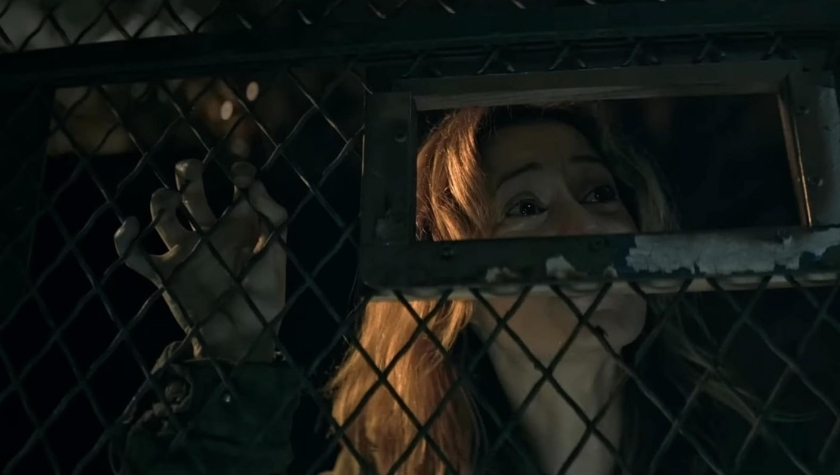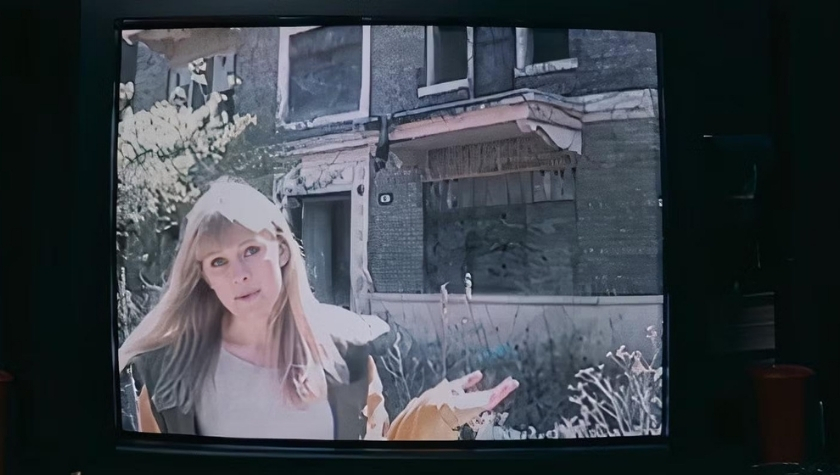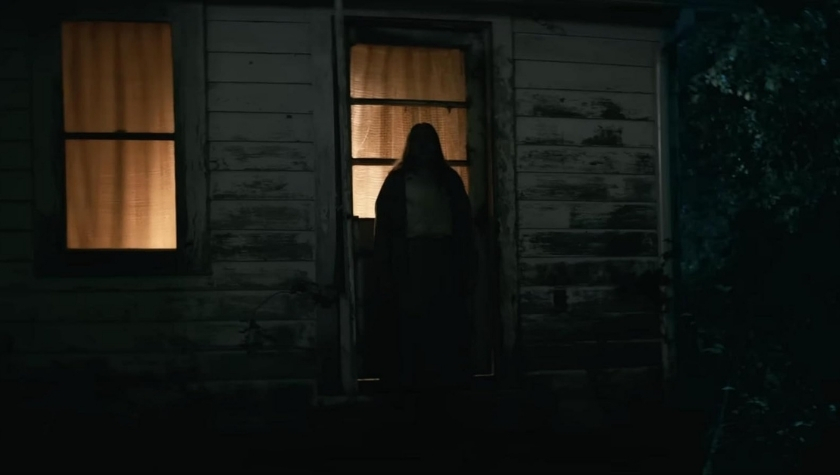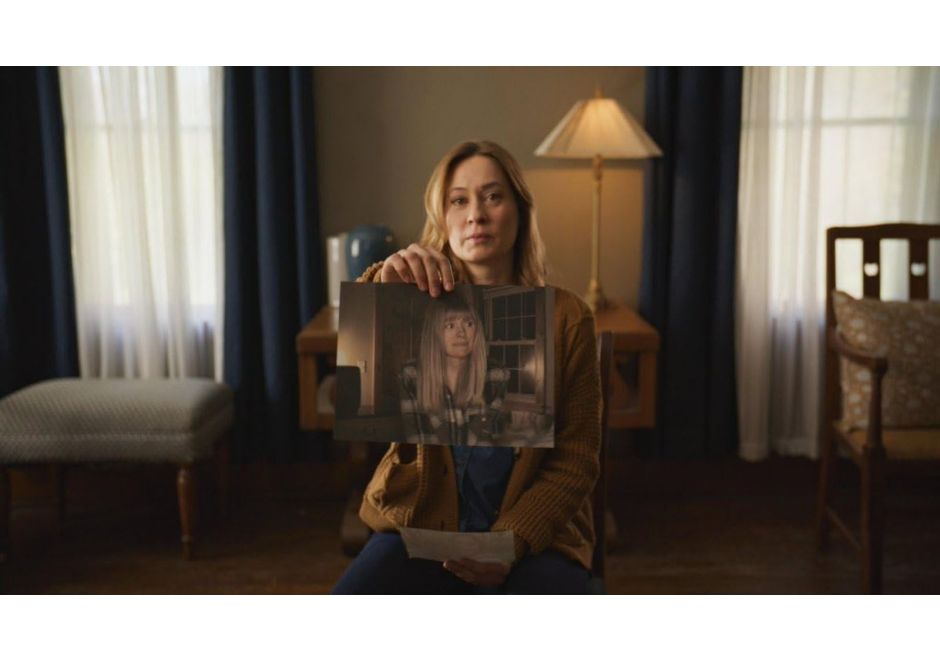Shelby Oaks has finally arrived in theaters, and it’s been a long road for writer/director Chris Stuckmann.
Stuckmann, who co-wrote the script for the horror screenplay with wife Sam Liz, built his career as a YouTube critic with a broad and supportive following, but as he tells us, he’s always wanted to be on the creative side. The team pitched the idea for Shelby Oaks around six years ago, then quietly filmed some content for the project and put it up online in 2021 as Paranormal Paranoids.
Those videos, ostensibly from a ragtag team of paranormal investigators who went missing, form the foundation of Shelby Oaks’s plot. What happened to them, especially Riley (Sarah Durn), who was never found?
Stuckmann wrote the script and then crowdfunded the project via Kickstarter. Eventually, horror maestro and friend Mike Flanagan came on board to produce, then NEON to distribute. The company helped fund some additional shoot days and VFX. Through the pandemic and multiple strikes, Stuckmann and his crew kept at the project.
Shelby Oaks blends mockumentary framing with found footage elements and traditional narrative filmmaking to tell its atmospheric tale of grief and supernatural terror. The film premiered at Fantasia International Film Festival last year before hitting theaters this October, marking the culmination of a years-long journey.
We spoke with Stuckmann to learn how it all came together and get his view on tackling horror.
Editor’s note: The following interview has been edited for length and clarity.
Final Draft: I'd love to hear you talk about how you approached this project. I know things changed as you got more backing, but how'd you start writing this script?
Chris Stuckmann: First off, I use Final Draft. I love Final Draft.
The first initial thing was my wife and I in 2016 shooting a YouTube sketch that was found footage that evolved into this bigger idea. Her and I brainstormed quite a bit for three years. Writing notes, writing longhand notes, writing on the computer, of course, in our phones, and just talking about it for a very long time before writing a treatment, a beat sheet of basic ideas that went from point A to point B.
And in 2019 when I met Aaron Koontz at Fantastic Fest, and I pitched him this idea on a whim, literally bumped into him and just kind of was like, “Oh, you're a producer. I'm going to pitch you an idea.” I just did it. As soon as he was intrigued, I went back home and started to actually write it. And then COVID happened, which was a nightmare, but we kept writing and we kept at it.
Final Draft: You had a lot of those roadblocks. You had the strikes, you had a lot of stuff going on, so what kept you going as a writer?
Chris Stuckmann: Yeah, a global pandemic. Two strikes, lost money, got money, lost money, got money.
A love for telling stories [kept him going]. I mean, ever since third grade, I've been writing stories. I read a Goosebumps book in third grade and became obsessed with horror and started writing my own story. English class and reading class were always my favorite classes in elementary school. I always got straight A's. They felt so easy and fun, and I was always excited about homework in those classes. And the teachers always let me do creative writing and they never cared that if they had a writing assignment that they let us choose the basic idea of what we had to do. Sometimes they would be like, “You need to write something that's about a story of some kind, and it has to be at least this amount of words.” And I would always ask them, “Can it be creative? And they were like, “Sure."
So I would just take that opportunity to write another short story, and I think that that love of telling stories and also feeling catharsis and even some sort of emotional therapy or release through fictional stories has always kept me going.


Final Draft: So when you were releasing those initial YouTube videos, was it always a plan for those to be part of a larger feature?
Chris Stuckmann: The first few Paranormal Paranoids episodes that we shot on tape, it was always like, can we shoot these for super cheap and put them on YouTube and not attach our names to them or anything? No official announcement of any kind. Just let them live on YouTube.
And then the goal was we would make an announcement that we “acquired this IP,” so we kind of generated our own IP.
Final Draft: I want to touch on your background as a YouTuber and a critic. How do you think that your experience as a critic influenced how you approached this as a writer?
Chris Stuckmann: It's funny, because I can't say that necessarily my experience as a critic specifically influenced this. Because my reality is that I've been writing stories since, as I said, third grade. So the reality that I live in is stories. First storytelling, shooting short films as a teenager, shooting features as a teenager. Even this just felt like a natural continuation of that.
The way that I am perceived is as a YouTuber … It makes sense, is what I'm saying. But from my reality, it's always been telling stories, whether that's writing or filming.
But as a professional film critic over the years, obviously I saw way more movies than I think I normally would have if I hadn't have been. And so immersing myself in film all the time, seeing so many different types of movies, big and small, going to arthouse theaters, going to big mainstream theaters, experiencing film festivals, those types of experiences absolutely just made me yearn to make the movie even more.
Final Draft: With you initially self-funding and crowdfunding this, how did that impact how you approached the story? I assume with a lower budget in mind.
Chris Stuckmann: The script had already been written by the time we got the Kickstarter, and so at that point we were just trying to figure out, how can we please get more days to shoot this movie? We just need more time.
We had shot listed everything before we did the Kickstarter. We were staring at this long schedule of like, “This is what we have to shoot the movie, and I don't know how we're going to do this.” And so the Kickstarter was started out of a necessity for not being able to shoot the movie without it.
And I was very reluctant and scared to do it, but I'm really glad I did. It worked out. The backers have been amazing. We were able to fulfill all of our rewards, which was a major thing that was very important to me.
And so it didn't really change the script. What it changed was our ability to shoot for longer, to get better gear, to hire more crew.


Final Draft: Is there one big challenge that you faced on this, story-wise?
Chris Stuckmann: Yes. I wanted to approach this story from multiple lenses, literally. And so you have a mixed-media format that's telling it. There's a mockumentary aspect, there's a found footage aspect, traditional narrative. You're seeing news reports, you're seeing images. There's a mixed media format to the movie. I knew how to do that visually, but the writing of that was something I really had to learn.
For the documentary portions of the movie, we did write and script every bit of B-roll, because all of that has to be shot, and so we have to know what we're shooting. And so you would have Mia [Camille Sullivan] and her chunk of dialogue, and it would usually say V.O., or voiceover, and then it would be “Insert,” and I would describe the B-roll of what she was talking about while we're seeing it. So “an aerial shot of the ghost town of Shelby Oaks.”
And that meant that I had to know I could find a place that would actually do that, because we were shooting for this very low-budget movie. And there was this three-block abandoned radius of abandoned homes in Cleveland. So I would drive around and look for places like that that could become the ghost town of Shelby Oaks and then write those elements of B-roll into the script.
So part of it was like, how do you actually write a mockumentary? What is the process for that? Because it is a very different writing process, and it was also important for our actors to know who is in the documentary when they are being interviewed, what they are referring to when they are speaking about something. So they had to know, “When I'm saying this, this is what you're going to be seeing.” So all of that was very spaced out carefully in the script.
Final Draft: Do you have any advice for building tension on the page?
Chris Stuckmann: It's funny because I read a lot of scripts and I have a lot of really good writer friends, and all of us do it differently.
I do have friends that way where you can tell that they're listing out the things that happen, and that's okay, that'll work. But you can always tell that they're thinking, “Oh, the director will come in and give that flavor.”
I like to write where you are, hopefully, visualizing it while you're reading it and really feeling the way it flows. I don't necessarily write camera direction, but since with this I was going to be the director, there were a few moments in the script where I did. I wrote, “pan left" or "dolly forward,” or whatever occasionally. But I find that if you read that in a script, it takes you out of the experience if you're reading camera direction.
And so for me, it's about trying to put you in the headspace of the character. If there is a sound that occurs behind [a character] making you feel like, “Oh, crap, there's something back there,” and not just putting a sound behind her that's like, “Okay, I know what that means."
I play around with italics too. Italics, I think for me, can sometimes make a description line feel like it has more impact. And sometimes things are bolded. If you read a Beck and Woods script, they really go hard with a lot of that. A Quiet Place script, there's an entire page that just says BAM, because it was the first sound you heard for 30 minutes, and so they wanted it to really feel impactful. So I sometimes have a little fun with it like that.


Final Draft: What about your approach to building characters?
Chris Stuckmann: On this I had things for all the actors. Some of them wanted them and some of them didn't because they just wanted to build it themselves, but they were open to hearing whatever I thought.
I had actual three- or four-page documents for all the Paranormal Paranoids. They all got a backstory with photos. I mined photos off Google of, “Oh, this is the type of neighborhood you were raised in and this is the type of family you had. You guys were more middle-class, you guys were more working-class.”
To make them feel like a sense of backstory.
I also don't want to go too overboard with that, because then you're not allowing the artists that you are hiring to bring their own stamp to it. You want to give them something, but you don't want to force them into a box where they're like, “Oh, well, I had this idea and now I can't go there because you told me that she's this.”
Camille Sullivan, who plays Mia, we had a lot of discussions about this very long journey that she's been on of trying to find her sister and what that feels like to be completely alone.
On the page, in regards to introducing characters, I try to be careful. I don't want to give too much. It's usually, I think for me it would say Mia, a vague age range, and then a sentence that kind of quickly gives you a taste of who they are. And it's rarely ever about physical appearance. It's usually entirely personality or the general feeling of how they carry themselves.
Final Draft: Is there one thing that you learned from making this as a writer that you're going to carry forward?
Chris Stuckmann: Yes. I think something I really learned was don't stress about the page count. In some of my earlier years trying to get things made, I would read a lot of advice—and even still now, my friend has reps, and they always tell him, “You have to be 105 pages.”
And I really hate hearing that. I hate this notion of like, “Oh, 105, that's where it's at. And the inciting incident happens here, and this is where the shift [happens], and this is, blah, blah.”
When I read, I've been sent a lot of scripts over the past year for consideration to direct, and I've read all of them, and you can always tell when one of them is trying to box themselves into this structure that other people tell them they have to be in.
Then when one comes along that just feels like they learned the rules, and now they don't care anymore, and they're just writing how they want to write, those ones always really stand out.
So what I learned the most on Shelby was like, “Hey, if your script feels like it's at a good completion around page 90, great. End." There's no reason you have to try to get to some sort of industry acceptable standard of page count, and don't worry about that stuff. Just sit down and write it and get it out of you.
It's all about just throwing things at the wall at that point, at that stage, and figuring out later you can figure out the harder stuff of, "I want this page count to be here, or I want this to happen here” when you're first sitting down to write your first draft. Don't worry about that kind of stuff.
I think that's something I'll take because I stressed way too much about it being a really damn good first draft, and I think that definitely made the process longer and took me longer to get to that first draft completion.
Final Draft: Was yours maybe a little bit shorter? It’s so atmospheric.
Chris Stuckmann: I think Shelby's like, 102 pages. And I do explain a lot of that. There's a seven-minute chunk of the movie with no dialogue, so there's probably about six or seven pages of just tension-building in the script, because I really wanted the audience to get a sense of where Mia is and what she's seeing and what she's feeling.
Final Draft: Is there any other advice or anything you want to add?
Chris Stuckmann: I mean, the best thing that I'll say is what I wish more people said to me when I was trying to get a film made is, don't wait until you're ready.
A lot of people say things like that, not just with movies, but with having kids or getting a house or whatever. There's always this notion of like, “Oh, I'll do it one day when I'm ready.” And what does that even mean? When will you ever wake up and be ready to do anything?
Life is a series of events that are thrown at us that we have to immediately recalculate in the moment and figure out, we're never ready for life.
And so just start writing. Don't wait, just start. Literally turn this interview off and just go start writing. Just do it.

